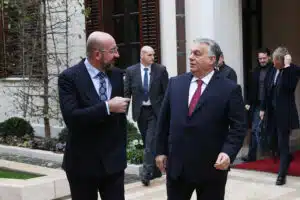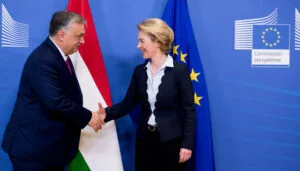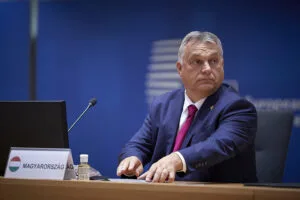Brussels – Viktor Orbán is now much more than a loose cannon. For the European Union’s short- and medium-term ambitions, Hungary is to all intents and purposes an obstacle, as has become evident in the weeks leading up to a decisive meeting in Brussels, the European Council of 14-15 December. And as put in black and white by two letters sent by the Hungarian prime minister himself to the president of the EU Council, Charles Michel, in which the expectations on Ukraine’s accession negotiations and the revision of the 2021-2027 multiannual financial framework are described as ‘unfounded‘.

The words contained in the
letter obtained by some European press organs are a real setback for the EU institutions, but above all for President Michel, who only a week ago had travelled to Budapest
to attempt to mediate with Orbán to avoid a stalemate at the summit of the 27 heads of state and government scheduled in a few days. “In my previous letter I reiterated my initiative to hold a strategic discussion on our general approach and policies towards Ukraine,” writes Orbán, who even after the face-to-face meeting with Michel continues to believe that “the European Council is not able to take fundamental decisions if no consensus is found on our future strategy towards Ukraine.” It is for this reason that the Hungarian prime minister goes to the furthest extreme, speaking about the two priority issues at the mid-December summit: “I respectfully urge you not to invite the European Council to decide” on Ukraine’s accession negotiations and the EU budget review, “as the obvious lack of consensus would inevitably lead to failure“.
It will not please President Michel that Orbán used his own words, but reversed their meaning, when he claims that he “must avoid this counterproductive scenario for the sake of unity, our most important asset“. It was precisely the Council’s President, who last Monday (27 November) in Budapest, asked the Hungarian prime minister to bury the hatchet – the threat of a veto on the Council’s conclusions – in the name of a ‘constant effort’ for European unity. Instead, Orbán has stepped up his game on both issues. The Commission’s proposal to start EU accession negotiations with Ukraine is branded as ‘the end of the EU’s enlargement policy as an objective and merit-based instrument‘ and ‘contrary to the Council conclusions’ of 23-24 June 2022, when Kiev was granted candidate status: ‘A new option must be developed’

Added to this is the proposed revision of the EU’s multi-year budget 2021-2027, with the Union’s support strategy for Ukraine at its heart. The Commission has proposed to create a EUR 50 billion financial reserve for the next four years consisting of grants and loans: EUR 33 billion in loans will be financed by borrowing on the financial markets, EUR 17 billion in grants will come directly from the additional resources provided by the revision. Orbán called the proposal ‘baseless, unbalanced and unrealistic’ and called for ‘a new, inventive and future-proof approach, based on the political and financial realities of the member states’. In other words, this would require ‘further efforts, additional time and a more comprehensive reflection’, which were not considered possible at the last leaders’ summit in 2023.
The tangle of EU funds to Orbán’s Hungary
Yet, unless it’s a bluff, Orbán’s could be the ultimate (possibly successful) attempt to blackmail the EU institutions and gain access to the EU funds earmarked for Budapest but currently frozen for various issues, from the rule of law to fundamental rights.
According to the latest rumors among European officials, the European Commission would be ready to disburse “up to a ceiling” of EUR 10 billion “before 15 December” from the cohesion policy funds (although there is little transparency on the figures), after having given the green light to the EUR 4.6 billion RePowerEu chapter with its EUR 900 million automatic and unrestricted pre-financing. All decisions that seem at the very least heartfelt in their timing ahead of the mid-December European Council.
 According to the most accurate data provided last May by the same Commission services, the EU funds allocated to Hungary that are currently frozen by Brussels stand at EUR 28.6 billion, divided into three macro-areas: National Recovery and Resilience Plan (5.8 billion), Cohesion Policy funds (22.6 billion) and Home Affairs funds (223 million). The three paths proceed in parallel, each with a specific procedure (or several, depending on the nature of the funding). The first considers the ’27 super-objectives’ on the rule of law set by the Commission on 30 November last year to release Hungary’s NRP funds, i.e. 5.8 billion in grants. What is expected from Budapest is that judicial independence will be strengthened, so that judges’ decisions will be ‘protected from external political interference’
According to the most accurate data provided last May by the same Commission services, the EU funds allocated to Hungary that are currently frozen by Brussels stand at EUR 28.6 billion, divided into three macro-areas: National Recovery and Resilience Plan (5.8 billion), Cohesion Policy funds (22.6 billion) and Home Affairs funds (223 million). The three paths proceed in parallel, each with a specific procedure (or several, depending on the nature of the funding). The first considers the ’27 super-objectives’ on the rule of law set by the Commission on 30 November last year to release Hungary’s NRP funds, i.e. 5.8 billion in grants. What is expected from Budapest is that judicial independence will be strengthened, so that judges’ decisions will be ‘protected from external political interference’
The second chapter-definitely the most complex-concerns cohesion policy funds, which for Hungary are worth a total of EUR 22.6 billion in funding from the EU budget. Of these funds 6.3 billion were frozen through the cross-compliance mechanism on the rule of law by Council decision in December 2022. This is a stand-alone procedure covering 55 per cent of the funds allocated to Hungary from three operational programmes financed by the European Regional Development Fund (ERDF), the Cohesion Fund, the Just Transition Fund (JTF) and the European Social Fund Plus (ESF+): ‘Environment and Energy Efficiency Plus’, ‘Integrated Transport Plus’, and ‘Spatial and Settlement Development Plus’. Of the remaining 16.3 billion, 12.9 billion are tied only to the implementation of judicial reforms (without further criteria) and are those that could be released by Brussels after the revision request. The remaining 3.4 billion is blocked due to non-compliance with horizontal enabling conditions – i.e. the necessary conditions as far as the EU Charter of Fundamental Rights is concerned – in three disputes between the Commission and Hungary: the ‘child protection’ law (the anti-LGBTQ2+ law), the law on academic independence and the law on the treatment of asylum seekers. The first issue is responsible for the stalemate of 3 per cent of the cohesion policy budget (i.e. 678 million), the second for 9 per cent (over 2 billion) and the third for a further 3 per cent (another 678 million). In order to release these funds, it will not be enough to put an end to the issues related to the independence of the judiciary (although this remains a pre-requisite for all of them), but the pending issues concerning other horizontal enabling conditions, such as potential human rights violations, will also have to be resolved.

Finally, there is the last issue to consider, that of the EUR 223 million from three Home Affairs Fund programmes. As Eunews learned in February from sources inside the EU executive – and then confirmed again at the end of November – it is 69.8 million from the Asylum, Migration and Integration Fund (AMIF), 102.8 from the Border Management and Visa Instrument (BMVI) and 50.5 from the Internal Security Fund (ISF).
English version by the Translation Service of Withub



